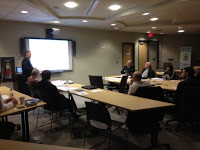Prevention and education are the tools used to put a stop to fraud.
Sgt. Tony Hayes giving a presentation to Police Commission on how to identify fraud and what are some common schemes. Popular scenarios that circulate around Saint John include a Microsoft telephone scam saying you’re computer is infected, being a mystery shopper but getting “paid” through fraudulent cheques, the Nigerian scam and counterfeit bills. Hayes says the rule of thumb is if it’s too good to be true, something must be up.
The biggest victims are seniors. Hayes says they’re less internet savvy, and if they suffer from dementia or Alzheimer’s it makes tracking down the scammer that much harder. He says often seniors will put their trust in care takers, giving them their cards and pin numbers to run errands for them. That can turn ugly, if the senior finds the trustee has misused their account.
Hayes admits there’s a slim chance anyone schemed out of their money will ever get it back. A big problem is internet scammers are across many borders, making it tricky to track them down and take direct action.
Hayes says when you learn to drive you study a book and practice. He believes that should be the same with protecting yourself on the internet, where you can google “common frauds” and educate yourself on what’s out there.
City Police has 2 full-time investigators that deal directly with scams. There work with an average of 400 cases a year, where priority cases come first but everyone gets dealt with.







